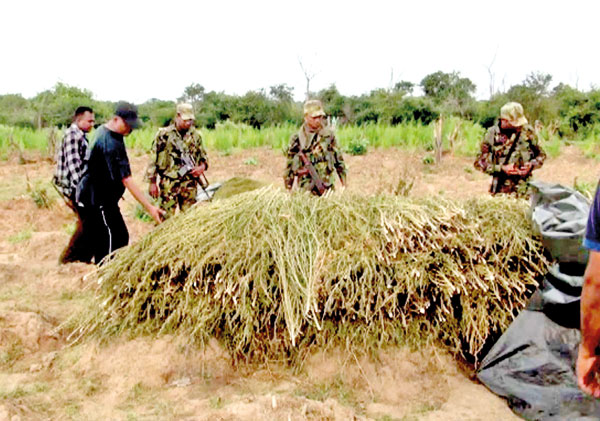News
Psychiatrists sound alarm over moves to legalise cannabis, call for meticulous research
View(s):By Wasantha Ramanayake
Meticulous research should be carried out before legalising cannabis, states the Sri Lanka of College Psychiatrists of (SLCP).
It has warned lawmakers that cannabis is a factor in drug abuse–as it is widely taken for non-medical reasons–and that the legalisation of it would adversely affect the entire population.
The SLCP does not endorse any form of legalisation of cannabis, the College states, as it would de-stigmatise and normalise its use, leading to an increased prevalence of cannabis dependence. This will cause widespread negative socio, economic and cultural impacts.
The psychiatrists point out that mental health services face many challenges including the rapid brain-drain of clinicians fuelled by the economic crisis and resources shortfall. The existing structure will not be able to cope with an increase in cases of mental illness which is likely to accompany any legalisation of cannabis, the SLCP says.

STF raiding illegal cannabis cultivation in Yala (file pic)
Cannabis use among young people may adversely affect their ability to pay attention, capacity to understand the visual and spatial relationship among objects, memory, processing speed, and overall intelligence.
Early age and regular use of cannabis increase the potential for adult dependence and the risk of developing mental illness. The continued use of it badly affects the functional outcomes of mental patients such as performance, relationships and living skills, the SLCP warns.
The effects of cannabis on the nervous system during the development of foetuses include adverse impacts on cognitive development and behaviour and, later, poor academic achievements.
While there is no scientific evidence to say cannabis is beneficial in treating psychiatric disorders, there is research to tie cannabis use to the onset of psychiatric disorders such as schizophrenia. It is also associated with symptoms of disorders associated with depression and anxiety.
Early as well as regular users of cannabis are more susceptible to a range of adverse psycho-social outcomes such as lower levels of educational attainment, poverty, unemployment, and increased dependence on State welfare and other illicit drugs, the SLCP points out.
It cautions that, in view of disease morbidity and the economic crunch, the cost-benefit of any form of cannabis legislation must be ascertained via thorough and careful research.
According to the Ayurveda Act of Sri Lanka, only ayurvedic physicians shall obtain cannabis for their medicinal preparations.
The American Psychiatric Association, the Royal College of Psychiatrists of the United Kingdom, the Royal Australian and New Zealand College of Psychiatrists as well as other international medical organisations have expressed concern regarding cannabis legalisation including its medicinal purposes, the SLCP notes.
Teenagers using cannabis sustain long-lasting damage to their developing brains and it is more harmful than alcohol, research conducted by the University of Montreal suggests. Drinking alcohol and consuming drugs such as cannabis at a young age are known to cause problems with cognitive abilities such as learning, attention and decision-making as well as academic performance at school.
Bar Association President Saliya Pieris, PC, said they have not yet considered the issue of cannabis legalisation.
Meanwhile, the first meeting of the parliamentary committee set up by the President to consider legalising cannabis as an export product was held on October 4. Its members are Justice Minister Wijeyadasa Rajapaksa, Plantation Minister Ramesh Pathirana, Health Minister Keheliya Rambukwella, State Tourism Minister Diana Gamage, Indigenous Medicine State Minister Sisira Jayakody, Presidential Advisor on Parliamentary Affairs Ashu Marasinghe, Defence Ministry Secretary Kamal Gunaratne, Health Ministry Secretary S.J.S. Chandragupta, State Tourism Ministry Coordinating Secretary Arosha Fernando and senior officers from the Health and Finance Ministries and the Board Of Investment.
According to the National Dangerous Drugs Control Board (NDDCB), cannabis is the most commonly used illicit drug with a prevalence of 1.9 % of the total population of above 14 years of age. There were an estimated 301,898 cannabis users in Sri Lanka in 2020. The highest number of drug-related arrests of 41,044 that year was reported for cannabis-related offences. The quantity of cannabis seized countrywide was 7,208 kilograms–a significant increase from previous years.
The best way to say that you found the home of your dreams is by finding it on Hitad.lk. We have listings for apartments for sale or rent in Sri Lanka, no matter what locale you're looking for! Whether you live in Colombo, Galle, Kandy, Matara, Jaffna and more - we've got them all!

